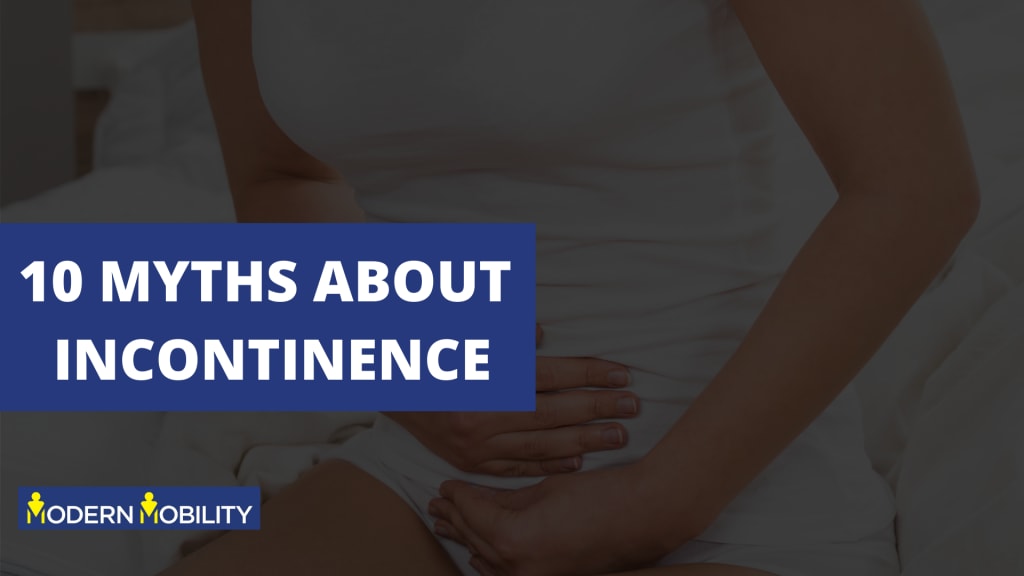Ten Common Myths About Incontinence
Here are the most common misconceptions about incontinence

Many people have misconceptions about urinary incontinence which can prevent people from talking about it and finding solutions. Here are the most common myths about incontinence.
1. It Happens To Everyone With Age
Myth
While it is true that changes occur in our bodies as we get older, urinary incontinence isn’t an inevitable part of growing old. However, it isn’t uncommon in older people. There are many different solutions you can take to prevent or improve your urinary incontinence.
2. Bladder Problems Aren't Common
Myth
Around 1 in 3 men and women experience unrainy incontinence as they age. In fact, it’s more likely in women after childbirth, pregnancy or menopause. 200 million people across the world are affected by unrainy incontinence. It is important to remember you are not the only one experiencing it.
3. It Only Effects Older People
Myth
Incontinence doesn’t just affect older people, there can be many reasons why that can cause incontinence, this could include obesity, anxiety, smoking or nerve damage caused by diabetes, Alzheimer’s, Parkinson’s. For women, this could be brought on by pregnancy, menopause and childbirth. For men, this could be caused by prostate problems. You could even have temporary symptoms from too much alcohol or caffeine.
4. The Only Successful Treatment For Urinary Incontinence Is Surgery
Myth
While surgery is one way to combat and treat urinary incontinence, it is not the only way to deal with it. Surgery for stress urinary incontinence is often the last resort as there are many other methods to try. These could include, behavioral treatments, exercises, lifestyle changes and medications that all could help. It’s best to speak with your doctor or GP about your issue so they can advise you on what treatment would be best for you.
5. Your Bladder Is Small
Myth
Most people don’t actually have a bladder that is smaller than normal, however, for some their bladder can’t hold as much as others. Another reason could be that the muscle loses the ability to stretch to hold that amount of fluid
6. You Can’t Train Your Bladder
Myth
You can train your bladder to where you use the toilet every 2 to 3 hours to help. This can include doing deep breathes or meditation to help you through the urge of needing to use the toilet. Eventually, you can extend the time you are able to wait.
7. You Should Drink Less To Stop Leaks.
Myth
Avoiding liquids to solve the problem can make your urine stronger which could irritate your bladder. Small doses of water throughout the day can help reduce leakage and improve bladder control. Your doctor may suggest you avoid certain drinks such as ones with high caffeine or alcohol which cause irritation. It may also help to limit how much you drink before bed to help with the issue overnight.
8. Exercising Can’t help.
Myth
An exercise called Kegel can help with strengthening the pelvic floor muscles, this includes tightening and relaxing the muscles that release and stop your urine. This exercise can work for both men and women. If you have trouble doing this by yourself a doctor or physical therapist with special training can help you work this out. When this exercise is practiced regularly this can help with bladder control.
9. Quitting smoking won’t help.
Myth
As smoking makes you cough more, this can stress your bladder causing more urine to leak. Some people sake smoking irritates their bladder and makes them want to use the toilet more. Smoking is also the biggest cause of bladder cancer which can lead to urinary incontinence or other serious problems.
10. It’s permanent, there’s nothing you can do
Myth
Medication and surgery aren’t the only options to have when it comes to precautions you can take. Studies show that vitamin d and magnesium either through food or other dietary requirements can help to prevent and improving incontinence. Kegel exercises are also a great way to strengthen the muscles around the bladder.
Frequently Asked Questions
How Do I Stop Urinary Incontinence?
There are a few different routes you can take to help prevent it. This can include:
Staying hydrated
Eating a high fibre diet
Staying physically active
A healthy lifestyle
What Drinks Are Good For Incontinence
Reducing the amount of caffeine you intake on a daily basis can help reduce incontinence symptoms. Other drinks that may increase the urge to go are Alcoholic drinks, Acidic fruit drinks such as orange juice or drinks with artificial sweeteners that may irritate your bladder.
If you would like any information on how to deal with incontinence visit a Modern Mobility shop near you, or if you prefer to shop from the comfort of your own home, view our range of incontinence products here.






Comments
There are no comments for this story
Be the first to respond and start the conversation.